|
Street Children Uganda | Street Children Uganda | Street Children Uganda | Street Children Uganda |
Acts as a temporary home for up to 20 street children in Uganda who have been neglected or abandoned.
More >
For more about life in Uganda including videos and photos, check out our Uganda profile pages.
More >
|
|

Others hunt for pieces of scrap metal that can be sold, finding small tasks to do in exchange for food or money including carrying luggage for people at the bus depot, sorting beans in a market stall, sweeping and doing laundry. Most of the children live in 'dens'. They do not club together as one homogenous group, rather older boys take money off younger children and beat them unless they comply or simply because they catch them playing on the streets rather than making money for them. UNICEF reported the plight of one street boy, a 10-year-old, who was stabbed, doused in petrol and set on fire by other children. He received severe burns however survived the attack. There are OVC (Orphans and Other Vulnerable Children) policies in operation in Uganda, however many are under-funded and under publicised leaving it to NGOs, charities and individuals to make a difference. Not only do they face resource issues but also a largely hostile population who mainly don't care about the problem. One such project working with street children in Kampala is Raising Up Hope for Uganda (RUHU), a non-profit, grassroots organization based in Bulenga just outside the city itself. RUHU is an umbrella organization that has an orphanage, day care and safe house for neglected children.
Get involved if you're not easily shocked and can commit for a period but please don't get involved if (a) you will find the experience emotionally too distressing or (b) you're not prepeared to check out the latest legislation regarding street children where you intend to work. For example, it is now a criminal offence to provide food, money or other practical offerings to street children in Kampala and, if caught, you will be incarcerated. The video above gives some insight into the life of street children in Uganda together with details of projects and programs working with these children that you may choose to support. |
 Many children also end up on the streets having been trafficked on the promise of money being sent back to their birth families with the going rate being 20,000UGX, some £5.00. That money is rarely forthcoming and the children go on to work in domestic servitude, brick laying, general and construction labouring, sand mining, stone quarrying, tree planting, cutting, and in other labour intensive industries; their destinations are as far afield as Canada, Egypt, the United Arab Emirates and Saudi Arabia.
Many children also end up on the streets having been trafficked on the promise of money being sent back to their birth families with the going rate being 20,000UGX, some £5.00. That money is rarely forthcoming and the children go on to work in domestic servitude, brick laying, general and construction labouring, sand mining, stone quarrying, tree planting, cutting, and in other labour intensive industries; their destinations are as far afield as Canada, Egypt, the United Arab Emirates and Saudi Arabia.

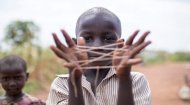
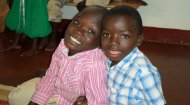
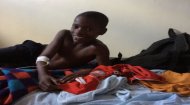
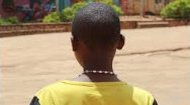



 The House of Hope or "Safe House" is a building which currently houses approximately thirty boys from ages ten to sixteen, all of whom are former street children. It is essentially a rehabilitation centre for young boys who were found living on the streets. RUHU operates an outreach program and gets to know the children who have gathered in the slums of Kampala from all over the country, by tending to their wounds and playing football with them to build trusting relationships before inviting them to House of Hope. At the House of Hope, they provide the children with beds, meals and education, all in a structured and loving environment and work to reintegrate them into normal life and give back the childhood that so many of them have lost to homelessness and poverty. As most of the children there have never attended school before, it is helpful for them to be put in a basic classroom setting, learning rules and structure. This transitional period helps before they can be placed in a formal school as part of the process of reintegration. After a year of living in House of Hope, these children are ready to move on to formal education.
The House of Hope or "Safe House" is a building which currently houses approximately thirty boys from ages ten to sixteen, all of whom are former street children. It is essentially a rehabilitation centre for young boys who were found living on the streets. RUHU operates an outreach program and gets to know the children who have gathered in the slums of Kampala from all over the country, by tending to their wounds and playing football with them to build trusting relationships before inviting them to House of Hope. At the House of Hope, they provide the children with beds, meals and education, all in a structured and loving environment and work to reintegrate them into normal life and give back the childhood that so many of them have lost to homelessness and poverty. As most of the children there have never attended school before, it is helpful for them to be put in a basic classroom setting, learning rules and structure. This transitional period helps before they can be placed in a formal school as part of the process of reintegration. After a year of living in House of Hope, these children are ready to move on to formal education.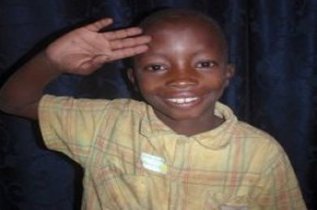 Find out more about Raising Hope for Uganda, its safe house, outreach projects and other services for vulnerable children and young people in need here and, if the situation of street children in Uganda concerns you, you can sponsor one of their children or make a donation to the project to help. Just to bring it home, the little lad (left) was poisoned by eating damaged food he had found in a bin in Kampala. Yahaya died alone in the gutter aged just fifteen. If you are interested in working with street children in Uganda there are some provisos and, sorry to be harsh, but we need to make them clear. Firstly, this is not poverty tourism. Please don't sign up if you simply want some photographs of distressed and anguished kids for your Facebook page to solicit comments from your friends about how amazing you are. Yes, that sounds harsh, but nevertheless true. These kids are not little Oliver Twists. They are hard. They do drugs. They injure and get injured. They live in a feral state in a state with no safety net. But they also crave love and affection in a sustainable and meaningful way.
Find out more about Raising Hope for Uganda, its safe house, outreach projects and other services for vulnerable children and young people in need here and, if the situation of street children in Uganda concerns you, you can sponsor one of their children or make a donation to the project to help. Just to bring it home, the little lad (left) was poisoned by eating damaged food he had found in a bin in Kampala. Yahaya died alone in the gutter aged just fifteen. If you are interested in working with street children in Uganda there are some provisos and, sorry to be harsh, but we need to make them clear. Firstly, this is not poverty tourism. Please don't sign up if you simply want some photographs of distressed and anguished kids for your Facebook page to solicit comments from your friends about how amazing you are. Yes, that sounds harsh, but nevertheless true. These kids are not little Oliver Twists. They are hard. They do drugs. They injure and get injured. They live in a feral state in a state with no safety net. But they also crave love and affection in a sustainable and meaningful way.


